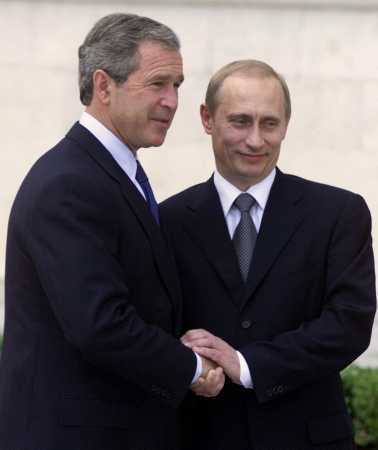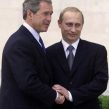
IS EUROPE TOO SMALL FOR BOTH BUSH AND PUTIN?
Publication: Eurasia Daily Monitor Volume: 2 Issue: 40
By:

“Disappointing” may be the common post-mortem on the Bratislava summit, but it would still be unfair to call the meeting a non-event. Reviewing the unresolved issues, it is now possible to see that the preparations on the Russian side were rather unconventional: it appeared that Moscow had been deliberately piling up as many problems as diplomatically possible.
The announced contract for selling Russian weapons to Venezuela was just a minor irritant, but the confirmation of the deal with Syria on delivering modern surface-to-air missiles was a more serious offense, particularly when the United States sought to engage Europeans in order to tighten the isolation of this “hereditary tyranny” (Nezavisimaya gazeta, February 17). Defying both European negotiations with Iran and U.S. pressure, Russian President Vladimir Putin personally announced his intention to visit this most prominent member of the reduced “axis of evil” and dismissed any doubts about the prospects of nuclear cooperation (polit.ru, February 12). If that was not enough, Russia raised objections in the UN Security Council against the U.S.-backed proposal to introduce an arms embargo on Sudan (Izvestiya, February 18).
For a one-hour summit meeting, that agenda was probably quite enough. At the press conference afterwards, Putin reported with visible satisfaction: “We talked a lot about . . . ” providing a short list of these contentious issues and mentioning “some solid options for normalizing the situation” (Interfax, February 25). Quite possibly, he was prepared to make a step back here and a conciliatory gesture there in order to grant President George W. Bush a sense of accomplishment from his fresh look into the blue eyes of his counterpart. The key task for Putin was to shift the dialogue away from the “unproductive” area of Russia’s retreat from democracy (Lenta.ru, February 23). It was Defense Minister Sergei Ivanov who asserted at a security conference in Munich one week prior to the summit that not an inch would be given on this territory, comparing the U.S. campaign for advancing democracy to experiments with replanting potatoes (Ezhenedelny zhurnal, February 14).
If this sort of wit would not work, Moscow was braced for the possibility of a disagreeable meeting leading to a temporary chill in relations with Washington (Rosbalt, February 21). A remarkable cover-up for this non-optimal outcome was prepared in advance: several “close-to-the-Kremlin” commentators revealed that President Bush would demand that Russian strategic nuclear weapons be placed under international control (Ekho Moskvy, February 18). In the best Soviet traditions, the Foreign Ministry even issued a special disproval of these “speculations” (Interfax, February 13), but that would have not precluded a subsequent propaganda claim for the “historic importance” of the Bratislava summit as the moment where Putin boldly turned down a U.S. “ultimatum.” No such re-evaluation now appears necessary, since the agreement on speeding up the program on securing Russia’s vast stockpiles of nuclear material was signed without any last-minute reservations.
Putin can now close this chapter with some relief, but he is hardly truly satisfied with the outcome (Kommersant, February 25). For him, such face-to-face meetings provide invaluable opportunities to employ his skills and charms for reinvigorating personal relationships — but there have been few if any signs of any special “soul mate” chemistry. Putin looked mildly surprised when Bush found at the press conference those words about the “great values” of democracy that he had forgotten during the meeting itself and half-heartedly promised to take into consideration “some of the ideas — I wouldn’t say “advice” — that I heard from my partner” (New York Times, February 25). He might have scored a cheap point here, but Putin now has serious reasons to worry about the next round of the game.
Moscow took note that Europeans were impressed with Bush’s proposal to place the issue of democratic reforms “in the heart” of common Western relations with Russia (Nezavisimaya gazeta, February 22). He himself failed to deliver on this promise in Bratislava but nevertheless has achieved more than could have been expected in reconnecting with the EU. Putin probably was not much impressed with the labored show of friendship between Bush and German Chancellor Gerhard Schroeder. He is perfectly aware that while the Slovaks greeted the U.S. President with much enthusiasm, the Germans remain skeptical if not hostile. Contradictions and tensions in U.S.-European relations are still many and sharp, but Putin’s space for political maneuvering between them has quite visibly shrunk. If the trans-Atlantic “reunification” momentum proves sustainable, the issue of accumulating “deficit of democracy” in Russia would indeed acquire top priority. Germany, as Moscow knows for certain, is not particularly interested in such prioritization, but Poland and Estonia and even Ukraine would try their best to keep President Bush “on target” with the agenda that he himself defined for his second term. Russia prefers to ignore all these pesky “new Europeans,” but they have proven remarkably skilled in building alliances with other smaller European states and are increasingly able to define the agenda for the EU and other European organizations (Gazeta.ru, February 10).
President Bush has every reason to congratulate himself with the success of his European “peace offensive,” but he should have thanked Putin for clearing the way for him. It was in the chilly but orange-colored Kyiv of last November and December that the United States and Europe rediscovered their common interest in supporting democracy. Moscow, at that moment, defined its interest quite differently and painted itself into a very awkward corner. In that crisis, Putin showed none of his talents for maneuvering and pragmatic bargaining; he had time to draw a few lessons — but apparently traveled to Bratislava with poorly prepared homework.




